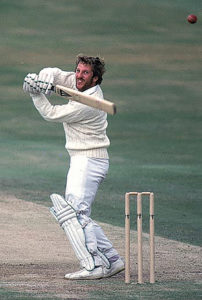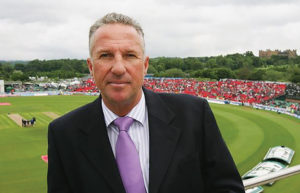SPORTING HEROES-SIR IAN BOTHAM

Sir Ian Botham was born on the 24th of November 1955. One of the best all-rounders in the history of the game, Botham played for England in both Test and One-day International cricket. He also played first class cricket for Somerset, Worcestershire, Durham and finished his career at Queensland.

He was a mercurial right-handed batsman and a right arm medium-fast bowler that could swing the ball a tremendous amount when on song. In Test cricket, Botham scored 14 centuries with a high score of 208 and from 1986 until 1988 he held the world record for the most test wickets until eclipsed by fellow all-rounder, the New Zealander Sir Richard Hadlee. He took 5 wickets in an innings 27 times and 10 wickets in a match 4 times. In 1980 he became only the second player in Test history to complete the “match double” of scoring 100 runs and taking 10 wickets in the same match.
His on-field success was accompanied by some front page headlines in the 80’s, when Botham was the most famous sportsman in Britain. To his credit and through all the controversy he has used this publicity to shine a light on the plight of children suffering from leukaemia and has undertaken several long-distance walks to raise money for research into the disease, most famously across the Himalayas in the footsteps of Hannibal, principally for the charity Bloodwise, for whom he has raised millions of pounds and later became president. In July of last year he was elevated to the House of Lords, sitting as a cross-bench Peer.
 1976 was a significant year for Botham as he scored over 1000 runs for the first time completing his first century. He also earned international selection by England in two limited over internationals that year whilst still only 20, making him the youngest player on view.
1976 was a significant year for Botham as he scored over 1000 runs for the first time completing his first century. He also earned international selection by England in two limited over internationals that year whilst still only 20, making him the youngest player on view.
Botham made his full Test debut at Trent Bridge in July 977 in the third test against Australia. He made an immediate impact by taking five wickets for 74 runs in the first innings, including the captain Greg Chappell for 19
Botham’s impressive start to his Test career at Trent Bridge meant he kept his place in the fourth test at Headlingley two weeks later. He was out for a duck with the bat in the first innings but made another excellent contribution with the ball by taking five wickets for only 21 runs in eleven overs. England went on to win the match and regain the Ashes, which they had lost two years previously.
After another two years of success in both domestic and international cricket, Botham was surprisingly given the captaincy of England in spite of his lack of experience, on the retirement of Mike Brearley. Leading the team in twelve Tests, Botham never won a match, securing eight draws and suffering four defeats. In 1981, after being dismissed for a pair against Australia in the first Test at Lords, Botham was replaced as captain by the returning Mike Brearley.
Botham, relieved of the pressure of the captaincy, continued to play for England under Brearley and achieved the highpoint of his career in the next test as England recovered to win the Ashes. In the legendary third Test at Headingley, Australia opened with 401 for 9 declared with Botham the only bowler to make an impact, taking 6 for 95. England responded poorly and were out for 174 with Botham again the only one tp put up any sort of resistance with a score of 50. Having been forced to follow-on, England collapsed again and were at 135 for 7 on the afternoon of the fourth day with an innings defeat looking a certainty. Botham was at the wicket as the last remaining recognised batsman alongside the fast bowler Graham Dilley with only two more of the bowling attack, Chris Old and Bob Willis to come. With a great rearguard action from both Dilley with 56 and Old with 29, Botham proceeded to smash it all around the ground and was 145 not out by close of play with Willis hanging on at the other end for 1. England scored a further 5 runs the next morning and Australia required only 130 to win and were expected to get them comfortably. However, after Botham took the first wicket Bob Willis performed his part of the miracle recovery and took 8 for 43, dismissing Australia 111. England had won and it was only the second time in Test history that a team following on had triumphed.
Botham continued to play great cricket that year and was involved in the game as a player until the early nineties, but this was the year that secured his legacy. Generally recognised as one of the greatest all rounders ever to play the game, his place in the history of cricket is assured.
